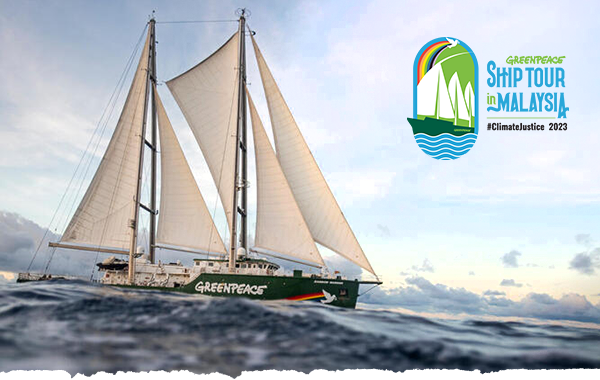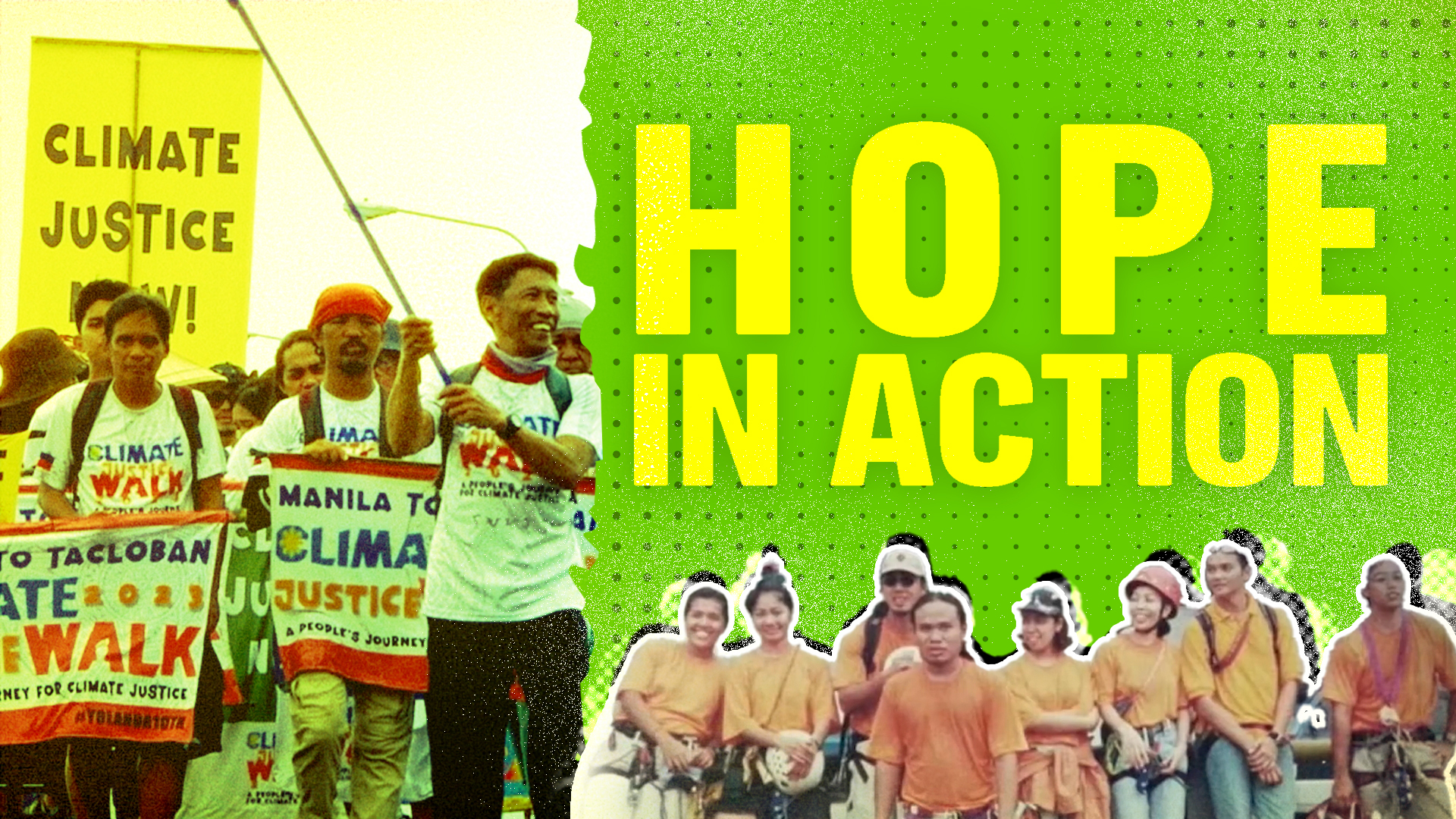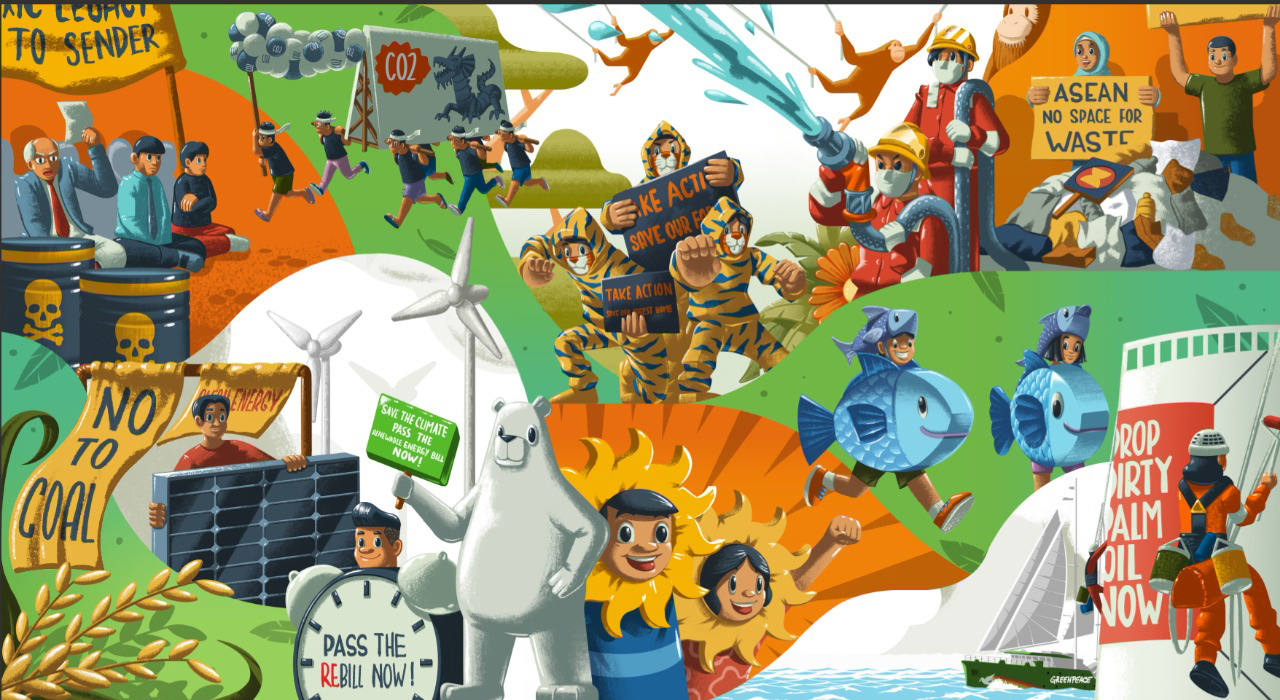The Greenpeace flagship, the Rainbow Warrior is making a comeback to Malaysia for the Climate Justice Ship Tour
Port Klang, Selangor – Climate disasters are becoming more frequent, scarring Malaysia’s landscapes, and impacting millions of people who are now forced to deal with the consequences of an ever-changing and relentless climate. According to the Intergovernmental Panel on Climate Change (IPCC) report, Malaysia will be hitting our first tipping point in 2025.
Despite the need for urgency, the Bill for a Climate Change Act has been delayed for another two to three years, which will place us right on the edge of a point of no return.
The Greenpeace Rainbow Warrior is revisiting Malaysia at a crucial moment in our history. Sailing to raise awareness on Climate Justice, the ship with its international crew and Greenpeace Malaysia will be calling for environmental protection, on behalf of the most vulnerable communities affected by the climate crisis: from floods and landslides due to unsustainable logging practices, to haze, air and plastic pollution that continues to affect our health.
During the ship’s 2018 visit, Greenpeace Malaysia highlighted our investigations into the imported plastic waste trade that culminated in The Recycling Myth report.
This time around, we will be hosting three forums related to the need for Climate Justice in Malaysia, including:
- Clean Air Forum for the release of recommendations on transboundary haze and air pollution by the Human Rights Commission of Malaysia (SUHAKAM);
- Climate Justice forum on deforestation with Natural Resources, Environment and Climate Change Minister YB Nik Nazmi bin Nik Ahmad;
- Plastics in a Circular Economy forum addressing issues related to ongoing plastic pollution in Malaysia and redesigning the system toward a reduction of plastic waste.

The Rainbow Warrior ship anchors in on climate injustices during its first weekend in Malaysian waters with a Clean Air Forum on Human Rights and Climate Justice Forum on Deforestation hosted by Greenpeace Malaysia.
Spotlighting the issue of air pollution at the forum on March 18 with the Human Rights Commission of Malaysia (SUHAKAM) and CERAH Malaysia members.
During the forum, among the group of experts discussed concerns with poor air quality that accounts for over six million deaths each year globally, according to the 2022 World Air Quality Report by IQAir, and roughly 32,000 avoidable deaths across Malaysia each year as reported by Centre for Research on Energy and Clean Air (CREA) and Greenpeace Malaysia.
A keynote address by Greenpeace Southeast Asia executive director Yeb Saño highlighted that air pollution has become the largest environmental risk factor for human health, together with the climate crisis:
“9 out of 10 people around the world breathe unclean air, most of them I would have to underscore, in low and middle income countries, disproportionately affecting the most vulnerable groups,” he said.
“The WHO’s recommended PM2.5 guideline rating of 5 µg/m3, however Malaysia exceeds this at a PM2.5 rating of 17.7 µg/m3 in 2022.”
SUHAKAM commissioner Tengku Mohamed Fauzi bin Tengku Abdul Hamid explained that one of the main recommendations on ways forward is the advocacy for the amendment of Article 5 of the Federal Constitution to include the right to a healthy environment:
“The right to life and personal liberty does not mean mere existence. As human beings, life means more to us than just simple existence. ‘Life’ encompasses all its various aspects including the right to a clean environment.”
“SUHAKAM has been consistent in calling for effective penalties for perpetrators of pollution. In order to protect the people’s rights to clean air.”
CERAH representative and Universiti Malaya Associate Professor of Sustainability Politics and Governance Dr. Helena Varkkey elaborated on the cracks seen in the 2002, legally binding, ASEAN Agreement on Transboundary Haze (AATHP) which all countries in the region signed:
“Some of the limitations to how effective ASEAN has often been derailed by finger pointing, national pride issues with countries that often don’t want to admit they cannot handle a problem themselves, and finally the ASEAN Way Principles like non-interference, technically governments are reluctant to be too confrontational.”
“Transboundary haze is not only transboundary in terms of its effects, but also its driver. So the first recommendation is to enact a Transboundary Haze Pollution Act tweaking Singapore’s so we can use it more effectively to monitor and make sure our companies in Malaysia and those functioning in Indonesia are not part of the problem anymore.”
“As the country who kick-started negotiations for the AATHP and as one involved in both the causes and effects of the haze, we should also take a leadership role to get regional cooperation back on track.”
CERAH representative and Environmental lawyer Kiu Jia Yaw ended on a positive note by announcing that during the forum, the Malaysian Bar passed a motion to adopt UN Guiding Principles on Business & Human Rights (UNGP):
“To make real progress in sustainable development, it is crucial that our society makes it safe, effective and efficient for the negotiation and reconciliation of different views, critiques and contestations.”
“This has to materialise through our institutions and systems. With that, we can all have a say in what ‘the better life’ means for Malaysia, without leaving anyone behind. Malaysia has contributed to the development of many UN frameworks on human rights, climate change and sustainable development. These should be our north star as we go on this journey.”
Among the forum attendants was the Regent of Pahang Tengku Hassanal Ibrahim Alam Shah ibni Al-Sultan Abdullah Ri’ayatuddin Al-Mustafa Billah Shah, who was accompanied by Rainbow Warrior Captain Pep Barbal Badia and Greenpeace Southeast Asia Executive Director Yeb Saño for a tour of Greenpeace’s Rainbow Warrior ship.
Panel speakers for the Climate Justice forum included Natural Resources, Environment and Climate Change Minister YB Nik Nazmi bin Nik Ahmad, Business Council for Sustainable Development (BCSD) Programme Director and Advisor Tan Hei Zel, Temuan Artist and Activist Shaq Koyok, and RimbaWatch Director Adam Farhan, moderated by JEDI Network for Ecology and Climate Analyst on Climate Change Policy Evelyn Teh.



